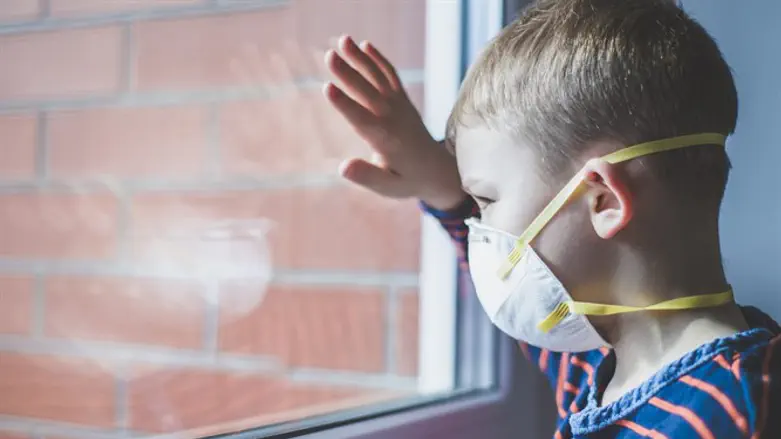
The coronavirus pandemic has killed over one million people worldwide and over 2000 people in the State of Israel alone so far, while governments across the world have been struggling to cope with the pandemic. Many governments have implemented lockdowns as a means of fighting against COVID-19. This particular strategy of fighting against the pandemic has come at a high psychological and societal cost, with the World Health Organization claiming that mental health services have been adversely affected by the pandemic in 93% of the countries worldwide. According to the International Red Cross, 51% of the people surveyed in seven countries stated that the pandemic has adversely affected their mental health.
The State of Israel is not exempt from this global trend. According to a report by Elam, a charity that monitors youth-at-risk in Israel, one out of every 11 teens that Elam met with reported that the pandemic exacerbated hunger, poverty and unemployment, which led to psychological depression. Drug usage, sexual abuse and domestic violence have risen in comparison to 2019.
There are steps that the State of Israel and other governments can take to mitigate the psychological cost of this pandemic. Firstly, the State of Israel should make hypnotherapy fully subsidized by the Israeli government. According to the Independent, studies have demonstrated that the coronavirus lockdowns across the world will cause one in four people to suffer from a form of post-traumatic stress disorder. The Wellness Institute has reported that “hypnotherapy has emerged as a credible-evidence based treatment option for sufferers of PTSD.” In some cases, a good hypnotherapist can completely cure PTSD, thus enabling someone who suffers from this illness to live a normal life again.
However, the average Israeli who suffers from PTSD or complex PTSD does not have access to this life-saving treatment. It is expensive and not covered by any of the health insurance plans in the Jewish state. The Israeli government should see to it that hypnotherapy is as widely available as possible, free of charge. This will significantly help to mitigate the psychological damage caused by the last two lockdowns, as well as any future lockdowns.
On top of that, the State of Israel should appoint a Minister of Mental Health as soon as possible to see to it that the psychological and societal cost of the lockdown measures are addressed. The issue is important enough to merit its own ministry, independent of the Health Ministry. Although the government has many expenses right now, money spent towards the development of a Mental Health Ministry is justified, given that the World Health Organization has found that every $1 spent trying to fight against anxiety and depression will lead to $5 being returned to the economy. After all, if a person is too psychologically damaged to return to the workforce due to the trauma experienced by the last two lockdowns, this will be a major burden on the Israeli economy. If these people are treated in a timely manner and given proper psychological care, they can work and be productive citizens again.
If another lockdown is needed, the rules of the lockdown should be changed so that mental health will be taken under consideration more. Limor Pineles, a manager at the Mercaz Yotzrim Hatzalacha (Creating Success Center), has been treating children with anger management problems, fear problems, self-confidence problems and all sorts of other issues for the past six-seven years. During this past lockdown fromwhich we are now beginning to emerge, Pineles’ center and other centers were not permitted to operate. She believes that was a mistake and that people like her should be permitted to operate if there is another lockdown.
“It is critical that these children get treated in a timely manner or else their situation will deteriorate,” she stressed. “Psychologists and psychiatrists could work, but not people who do emotional counseling at a time when we are needed most. These children are tired of learning over zoom. They need to have someone to talk to. Because of the corona, there are many children and parents living in fear and it is only getting worse. A lot of social problems are caused by lockdowns. They are not meeting with other children and this causes them to miss out on critical socialization. Many of the people that I help were angry to be told that I could not help them.”
Centers of that nature should be labeled an essential business if there is another lockdown, so that the psychological health of children who need that help will not deteriorate. Children do not always respond to conventional therapy and there is a need for innovative counseling, sometimes as an adjunct form of therapy, to learn to overcome their issues. Thus, a child with emotional problems may not be able to express himself via words but may be able to speak out about his issue via artwork. For this reason, the work done by emotional counselors with children is no less important than that done by psychologists and psychiatrists.
“The COVID-19 health crisis has exacerbated the psychological distress of millions of people,” ICRC Director-General Robert Mardini stated. “Lockdown restrictions, a loss of social interaction and economic pressures are all impacting people’s mental health and access to care. Mental health is just as important as physical health, especially in crisis situations, when mental health needs are especially critical.”
For this reason, the Israeli government should start to address the psychological cost caused by the pandemic, just as they are doing everything else to fight against the coronavirus.
Rachel Avraham is a political analyst working at the Safadi Center for International Diplomacy, Research, Public Relations and Human Rights. She is the author of “Women and Jihad: Debating Palestinian Female Suicide Bombings in the American, Israeli and Arab Media.”